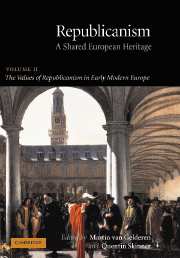Book contents
- Frontmatter
- Contents
- Contents of Volume I
- Acknowledgments
- Introduction
- Part I Republicanism and Political Values
- Part II The Place of Women in the Republic
- 7 Rights or Virtues: Women and the Republic
- 8 Women, Republicanism and the Growth of Commerce
- 9 Feminist Republicanism and the Political Perception of Gender
- Part III Republicanism and the Rise of Commerce
- Bibliography
- Contributors
- Index of Names of Persons
- Index of Subjects
7 - Rights or Virtues: Women and the Republic
Published online by Cambridge University Press: 11 January 2010
- Frontmatter
- Contents
- Contents of Volume I
- Acknowledgments
- Introduction
- Part I Republicanism and Political Values
- Part II The Place of Women in the Republic
- 7 Rights or Virtues: Women and the Republic
- 8 Women, Republicanism and the Growth of Commerce
- 9 Feminist Republicanism and the Political Perception of Gender
- Part III Republicanism and the Rise of Commerce
- Bibliography
- Contributors
- Index of Names of Persons
- Index of Subjects
Summary
In October 1789 Antonio Capello, the Venetian ambassador to France, wrote to the Doge about the events in Paris, describing the participation of women in the revolutionary movement in the following terms: ‘even this sex wishes to participate actively in the capital in the rebellion so as not to appear inferior to the other … crueller still than the men, the women have insisted on marching side by side with them armed with swords. In their ignorance and brutality, the common people remain distrustful’ (Fontana et al. (eds.) 1997, dispatch no. 201, 5 October 1789). He added: ‘I write after the uprising of those women whom we would call rivendigole, which began on the morning of Monday 5 October and in the course of which they incited the men to revolt’ (ibid., dispatch no. 202, 12 October 1789).
It was in such terms that one of the members of an exemplary and long-established diplomatic corps, representing a moribund republic that was to stagger on until 1797, commented upon the Paris days of the Revolution. The unlikely entry on the scene of women, and the actions of the people with whom they were to some extent identified, appeared to make no political sense. The ambassador also disapproved – in the name of the balance of powers – of the constitutional activities of the Assembly: ‘the National Assembly began by seizing all powers and amalgamating within itself all the delegations of sovereignty, usurping the executive's administrative functions and the judiciary's jurisdiction over criminal matters’ (Fontana et al. (eds.) 1997, Capello's account, 2 December 1790).
- Type
- Chapter
- Information
- RepublicanismA Shared European Heritage, pp. 125 - 138Publisher: Cambridge University PressPrint publication year: 2002
- 3
- Cited by



